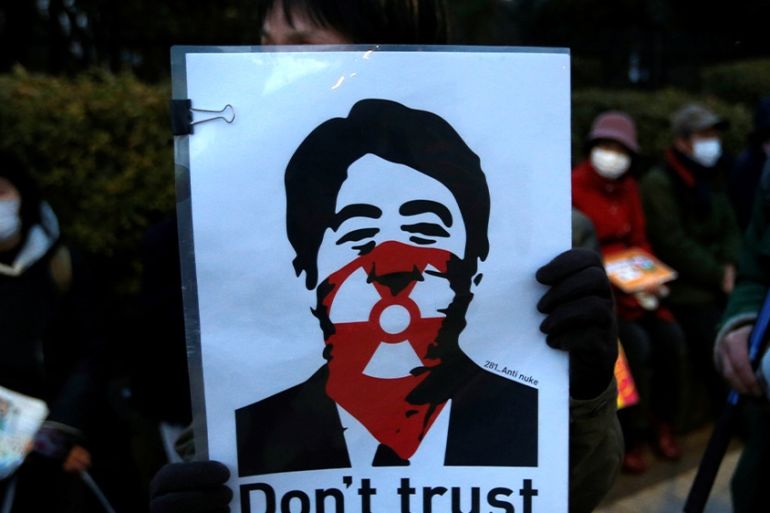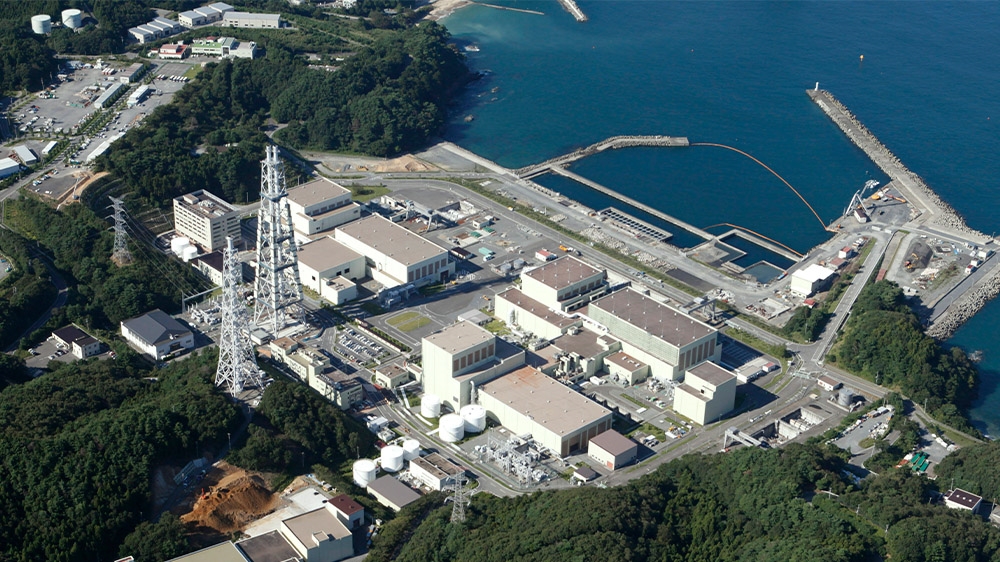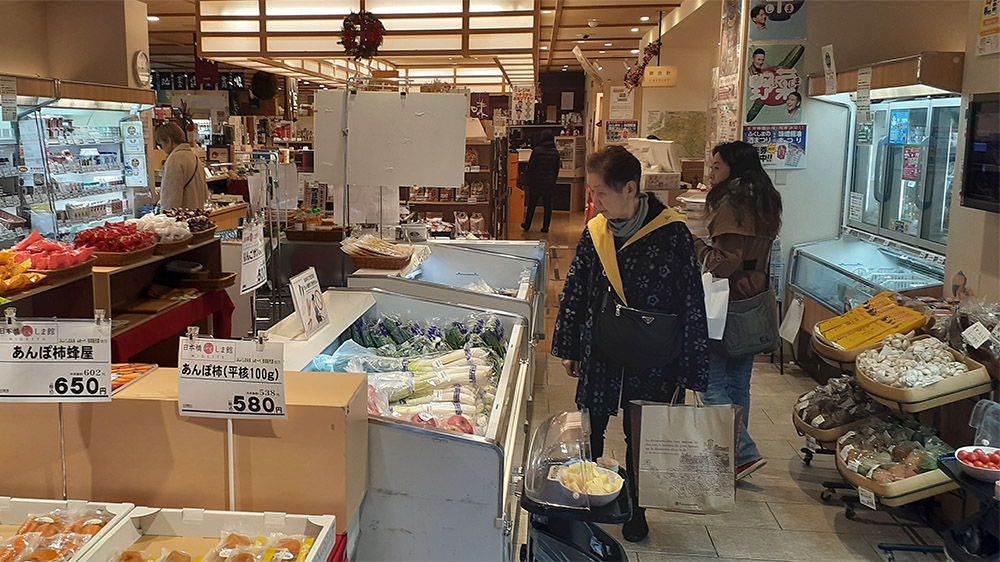No to nuclear: Japan wants reactors phased out, post-Fukushima
Japan is less reliant on atomic energy, but concerns are growing about its return to climate-damaging fossil fuels.

Tokyo, Japan – At the end of a decade in which northeastern Japan was devastated by a tsunami that triggered a nuclear disaster at Fukushima, atomic energy looks unlikely to make a comeback.
In the nearly nine years following the world’s worst nuclear accident since Chernobyl, the country’s reliance on atomic power for electricity generation has plummeted to between 3 and 5 percent from about 30 percent before the disaster, according to the Tokyo-based Citizens’ Nuclear Information Center.
Keep reading
list of 4 itemsBombs and viruses: The shadowy history of Israel’s attacks on Iranian soil
Russia says Ukraine attack hits Zaporizhzhia nuclear power plant
Nuclear energy cannot lead the global energy transition
And despite a period of uncertainty in the immediate aftermath of the meltdowns triggered when Fukushima’s cooling systems were overwhelmed by the tsunami created by the magnitude 9.0 undersea earthquake, the world’s third-largest economy has shown it can function with radically less nuclear power.
The public mood turned dramatically after Fukushima and the national trauma that ensued and combined with the increasing costs from aligning ageing plants with stringent post-disaster safety requirements, it is unlikely the nuclear industry will return to previous levels, according to experts, even as the government envisions nuclear power accounting for about 20-22 percent of electricity generation in 2030.
“It is obvious that it is very difficult to meet this target,” said Hajime Matsukubo, secretary-general of the Citizens’ Nuclear Information Center.
And while experts say while the anti-nuclear movement may seem to have quietened down, anti-nuclear feeling is firmly entrenched.
‘They say no’
“Japanese people’s sentiment (has) changed after Fukushima Daiichi and it is continuing until now,” said Matsukubo, whose non-profit organisation was established in 1975 by concerned atomic scientists to gather and publicise nuclear information and raise public awareness on the industry.
He said that even if people appear not as focused, if they are asked pointedly if they agree with nuclear power: “They say no.”

Before Fukushima, Japan had 54 operational reactors and for a brief time in the accident’s aftermath, not a single one was in operation. So far, nine have been restarted and authorities are considering the cases of a dozen more, according to Ministry of Economy, Trade and Industry figures. A further 24 are either under decommissioning or lined up for it.
Late last month, regulators gave initial approval for the restart of a reactor at the facility closest to the epicentre of the March 2011 quake. The No 2 reactor at the Onagawa nuclear plant could be running again late next year if further conditions are met. Onagawa was damaged in the double disaster, where the tsunami wave rose as high as 13 metres, but avoided Fukushima’s catastrophic meltdowns.
Japan imports nearly all its crude oil and natural gas. Underscoring such dependency, Prime Minister Shinzo Abe told a nationally televised news conference in 2016 that the nation could not “do without” nuclear power.
But Shinjiro Koizumi, minister for the environment and nuclear issues and the son of anti-nuclear former prime minister Junichiro Koizumi, said after his appointment in September that the country needed to wean itself off the atom.
“We will be doomed if we let nuclear accidents recur,” he said, according to Kyodo News.
Safety costs
Japan’s mass-circulation newspaper Mainichi Shimbun in an editorial after the Onagawa decision cited the newspaper’s own research that found 11 top power suppliers had spent in excess of 5 trillion yen ($45.7bn) on nuclear safety since Fukushima.
“As costs balloon, it is becoming increasingly difficult, even absurd, for the government and power companies to maintain the argument that nuclear power is ‘cheap’,” the editorial said.
“The more thoroughly safe the plants become, the more time and money is needed,” it continued. “We must ask, then: is it realistic to press on with the safety upgrade and reactor restart policy? We cannot dispel our suspicions that the answer is, in fact, ‘no‘.”
Japan has clearly shown it can function on less nuclear-generated power, but the shift has come at a cost: an increasing reliance on fossil-fuel alternatives such as coal, oil and natural gas. And with concerns over climate change intensifying, that is drawing international attention.
“I‘m very much aware of the challenges of Fukushima to the Japanese electrical sector,” said Paul Simpson, CEO of London-based non-profit CDP, which runs a global disclosure system that aids investors, companies and local governments in managing their environmental footprint.
Simpson, speaking at a forum on decarbonisation in Tokyo last month, stressed that coal was simply no longer an option and countries still using it must search for alternatives, citing Germany’s plan for no new coal use by 2040.
Alternative energies
“Japan needs to find a transition pathway from this, and I know this is challenging,” he said. “But coal is socially unacceptable … from a climate-risk perspective but also from an air pollution perspective.”

According to Matsukubo, about 30 percent of Japan’s electricity generation comes from coal and 43 percent from natural gas. And the country has moved to build new coal-fired power plants since Fukushima.
“It’s disastrous,” Matsukobo said, stressing that Japan needs to move to renewable sources of energy; an area in which Simpson also pointed out Japan is lagging, even though the government has promised to increase the country’s use of renewables by 2030.
There was always some ambivalence about atomic energy in Japan – the only country to suffer a nuclear weapon attack when the United States dropped bombs on the cities of Hiroshima and Nagasaki in the closing days of World War II.
Pope Francis, visiting Japan in November, surprised no one when he condemned nuclear weapons. But the pontiff, the first to venture to the country since 1981, went so far as to suggest that nuclear energy itself was a problem.
“I have a personal opinion: I wouldn’t use nuclear energy until it is totally safe to use,” the leader of the world’s 1.3 billion Roman Catholics said in comments to reporters during his flight back to Rome from Tokyo, Kyodo reported.
Ramping down
Alexander Brown, who has studied the anti-nuclear protest movement in Japan, said that because Japan had supported atomic power for so long, there was a sense of inertia despite post-Fukushima opposition, ageing infrastructure and the remote chance of new reactors getting the green light.
“There’s a sort of built-in time limit to how long the industry as a whole can continue,” said Brown, currently a Japan Society for the Promotion of Science international research fellow at Japan Women’s University.
He also emphasised, however, that Japan’s turn against nuclear energy had also coincided with a key change in its domestic economy; less industrially robust and therefore not as hungry for energy as before.
“Why have the lights stayed on,” Brown asked rhetorically. “One is, yes, increased fossil fuel use, but another is there’s just less demand than there was in the peak time of manufacturing onshore in Japan.”
Brown calls that an “uncomfortable truth” for much of Japan’s ruling establishment – including the prime minister and his eponymous “Abenomics” economic revitalisation programme – which clings to a belief in a model of vigorous growth.
“And I think one of the amazing things when I look at the anti-nuclear movement, to me, was it was full of people looking at what are other ways that we can live,” he said.
“How can we embrace other values other than high consumption, high pollution, extreme overwork and look at things like de-growth economics.”